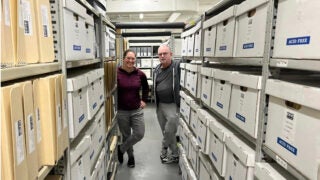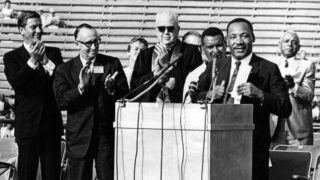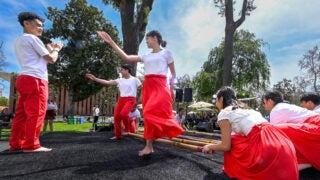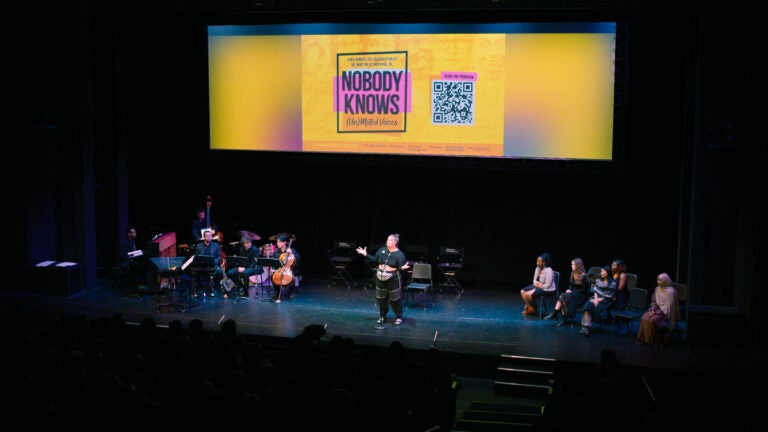
Nobody Knows: (Un)Muted Voices served as USC’s 43rd annual celebration of the Rev. Martin Luther King Jr.’s birthday. (USC Photo/Kris Head)
Trojans amplify stories of marginalized communities in ‘Nobody Knows: (Un)Muted Voices’
Inspired by the Rev. Martin Luther King Jr., students use song, dance, video and poetry to shine light on their challenges and triumphs.
Insisting she didn’t need a microphone, senior Malika Dinan of the USC School of Dramatic Arts spoke clearly as she shared with an audience of more than 200 people why she feels it sometimes takes a lot of courage to properly honor the legacy of civil rights leader Martin Luther King Jr.
“I don’t think a lot of us can honor King if we don’t have the courage to speak up about certain things that we feel we should be afraid of,” Dinan said during the Nobody Knows: (Un)Muted Voices event on Jan. 19. “King was a very strong person, and sometimes strength is hard.”
Dinan was among the dozens of student performers who had the courage to speak out as they took part in a program named after the first two words of the African American spiritual “Nobody Knows (The Troubles I’ve Seen).”
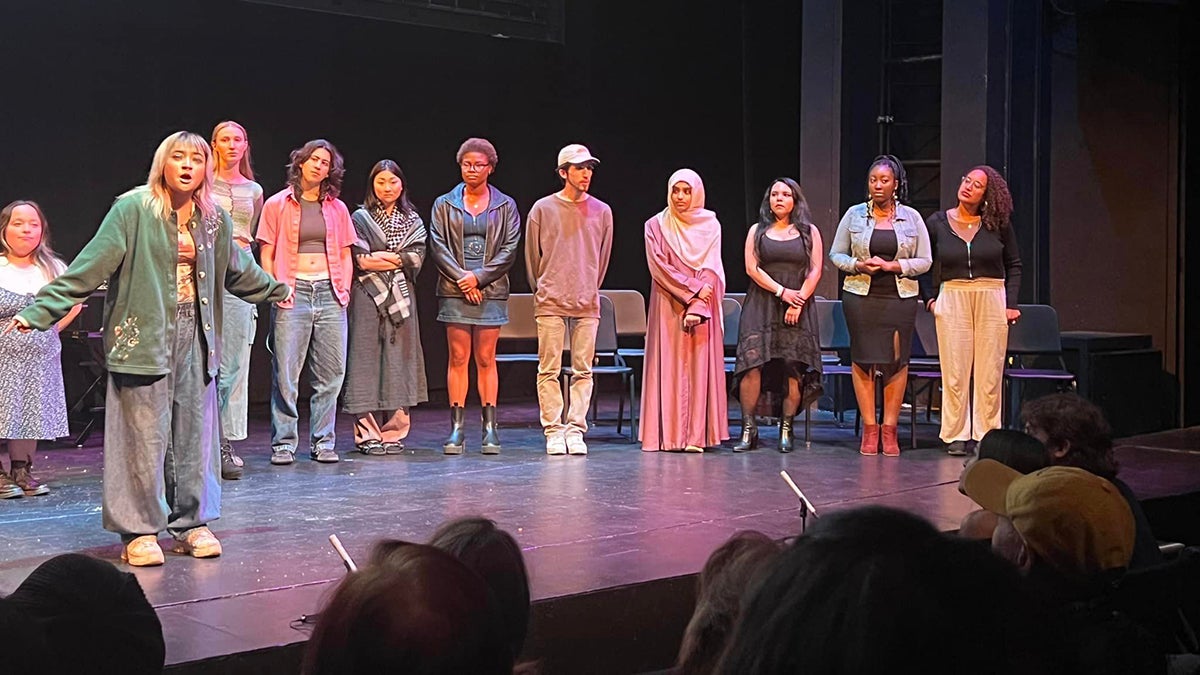
The event inside Bing Theatre on the University Park Campus served as USC’s 43rd annual celebration of the birthday of King, the Nobel Peace Prize recipient who was murdered in 1968. The aim was to “unmute” and amplify the stories of students and to help others understand their identities, stories and experiences.
Professor Ronald C. McCurdy of the USC Thornton School of Music and School of Dramatic Arts Professor Anita Dashiell-Sparks curated the performances by Black, Latino, Muslim, LGBTQ+, Filipino and other students who shared their stories of challenge and triumph through poetry, dance, video and music. The performances dealt with such themes as racism, oppression, misogyny, patriarchy, microaggression, prejudice and privilege, among others.
McCurdy said the idea for the show came about after he noticed that some USC students who come from marginalized communities “kept their heads down” and “did not feel as if they were being as welcomed on campus as they perhaps should be.”
“They began to tell their stories, and as an artist, I began to say, ‘You know what? This is art,’” McCurdy said. “These are the raw stories of some of our most talented students here at USC.”
Telling their personal stories
Sophomore Mysha Amir of the USC Dornsife College of Letters, Arts and Sciences shared in a monologue what it feels like to be on campus as “a Muslim woman who embodies her religion for all to see” by way of her dress.
“When I look at you, I can see that look forming in your eyes with questions your lips are afraid to ask and judgment hidden behind that intense gaze, poorly masked,” she said. “When I look at myself, I wonder: ‘How many people didn’t speak to me in class because of the scarf on my head? How many people looked at me and instantly disliked me?’”
Amir said it is her hope that her fellow Trojans “choose the value of listening instead of assuming, the path of learning instead of stereotyping.”
School of Dramatic Arts sophomore Leilani Rodriguez talked about how, because of her dwarfism — “a disability that people see” — she sometimes experiences blank stares and quizzical looks from others on campus.
“It’s a hard conversation or topic that [people] can really just ask me about and be open,” she said. “I am human, and it’s the uniqueness I have.”
Rodriguez said not only has she embraced her uniqueness, but also that she hopes to be an inspiration to others and “to have people who are different feel like they should be represented and be seen.”
How to carry on King’s legacy
Midway through the event, a panel discussion about King featured several students along with Professor Brandi P. Jones of the USC Rossier School of Education; Naddia Palacios, assistant vice provost for student affairs, student equity and inclusion; Quade French, USC Dornsife associate dean and chief diversity officer; and Brandon Harris, associate dean for religious and spiritual life.
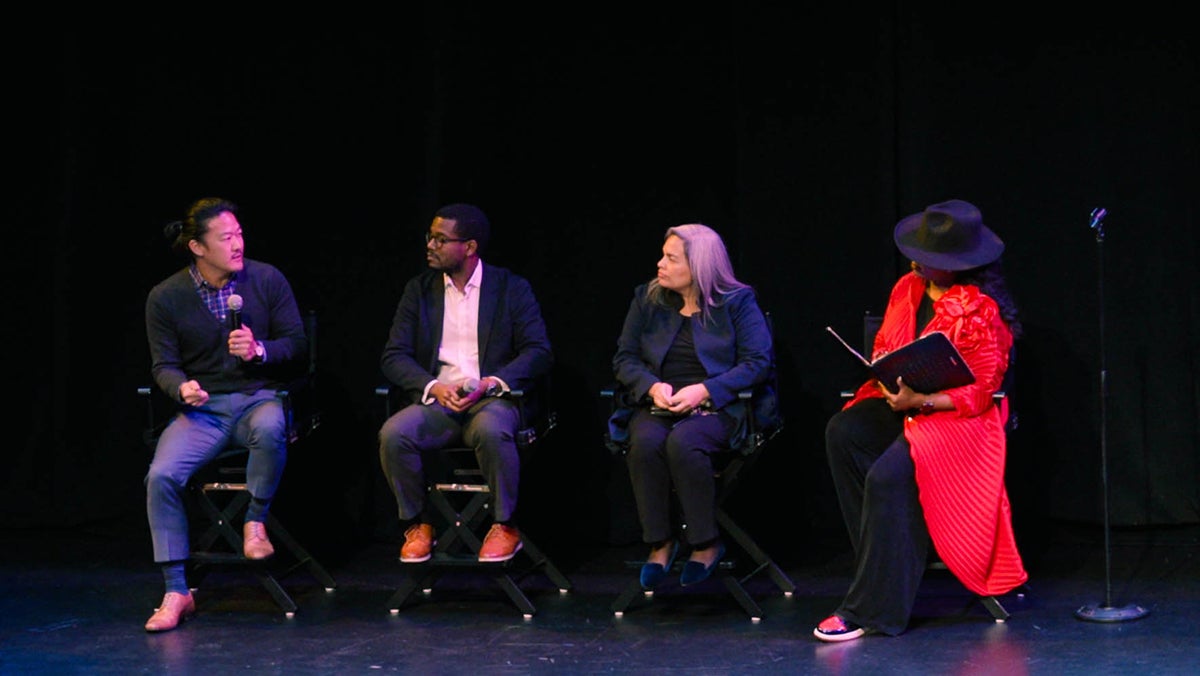
Jones asked Harris what people in the USC community can do to carry on the legacy of King, whose words and actions continue to resonate for all those seeking justice and equality in the United States and around the world. Harris started by reminding people to “lay aside the commodified and commercialized Dr. King” that is reduced to the iconic “I Have a Dream” speech he delivered during the 1963 March on Washington.
Instead, he suggested focusing on the “radical King” who sought to fight what King described as the “three evils of society”: poverty, racism and war.
“I think it’s time to re-embrace the radical role of universities, which is free inquiry and intellectual thought and championing justice,” Harris said. “So that when you leave this place, you leave not with just a degree that is stamped by the golden California sun, but you are going out into the world to pursue justice and liberty and freedom.”
Students share their dreams
The student performers closed the evening by standing in a semicircle and sharing their dreams for the campus, the country and the world. Those dreams included using art to make people feel less alone; loving and accepting people in the community regardless of appearance; and finally treating BIPOC (Black, Indigenous and people of color) women equitably.
One student drew applause when they said: “I have a dream that my kids are going to hear these stories and think, ‘I’m so glad things have changed since then.’”
Nobody Knows: (Un)Muted Voices was presented by USC Visions and Voices and co-sponsored by the USC Black Staff & Faculty Caucus and the Center for Black Cultural and Student Affairs.

